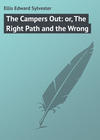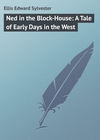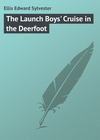Loe raamatut: «Wyoming», lehekülg 4
CHAPTER XII
Fred Godfrey was not altogether correct in his dismal prophecy.
Queen Esther, when she found that one of her prisoners was gone, gave expressions of fury and resumed the march up the river, her warriors keeping closer watch than before to prevent any other escape.
The procession halted near a boulder which rises about eighteen inches above the ground, and which may be seen to-day, as it lies directly east of the battle monument toward the site of burned Fort Wintermoot, on the brow of the high steep bank, which centuries ago probably marked the shore of the Susquehanna.
The eighteen prisoners were driven forward until this celebrated boulder was reached, which has been known ever since by the ominous name of "Queen Esther's Rock."
Here the captives were ranged in a circle around the stone, while the queen, with a death-maul and hatchet, proceeded to wreak vengeance upon her victims for the death of her son, killed by a scouting party, a short time before the battle.
One after another, the white men were seated upon the rock, and held by two strong warriors, while the terrible Katharine Montour chanted a wild dirge, and, raising the death-maul in both hands, dealt the single blow that was all sufficient.
Occasionally she varied the dreadful ceremony by using a keen-edged hatchet with her muscular arm, which was as effective as the death-maul wielded by both hands.
The work went on until eleven victims had been sacrificed, when one of the men, Lebbeus Hammond, was roused by the sight of his own brother, who was placed upon the rock, and tightly grasped by two warriors.
It was impossible to do anything for him, but Lebbeus whispered to Joseph Elliott:
"Let's try it!"
On the instant, they wrenched themselves loose from their captors, and bounded down the river bank.
They expected to be shot, and they preferred such a death to that which awaited them if they remained.
But the very audacity of the attempt, like that of Fred Godfrey, threw the Indians into confusion for the moment, and instead of firing they broke into pursuit, without discharging a weapon.
Fortunately for the fugitives, instead of keeping together they diverged, Hammond heading up the river. The warriors must have concluded that they were making for Forty Fort, and shaped their course with the purpose of shutting them off. The fort lay to the south and below, and, understanding the aim of the Indians, Hammond turned more directly up the river.
He was fleet-footed, and ran as never before; but, while straining every nerve, he caught his foot in a root, and was thrown headlong down the bank, rolling all in a heap underneath the bushy top of a fallen tree.
He started to scramble to his feet, when, like a flash, it occurred to him that there was no safer course than to stay where he was.
Only a few seconds passed, when the Indians approached and began hunting for him. How they failed to discover the young man passes comprehension, and it was only another of the several wonderful escapes which marked the massacre of Wyoming.
The savages peered here and there, drawing the bushes aside, and looking among the old logs. The poor fellow heard their stealthy footsteps all around him, and caught glimpses of their coppery faces, smeared with paint, as they uttered some exclamation and almost stepped upon him in his concealment.
Once he was sure he was detected, and he held his breath, fearful that the throbbing of his heart would betray him; but the red men moved away, and shortly after returned to Queen Esther's Rock to help in the executions going on there.
Hammond stayed where he was until all was still, when he crept cautiously out, and, swimming the river, made his way to the fort at Wilkesbarre, where, to his amazement, he found his companion in flight.
The escape of this patriot was no less extraordinary than that of Hammond.
He had also swum the river to the bar on the lower point of Monocacy Island, going almost the entire distance under water. Whenever he threw up his head for a breath of fresh air he was fired upon, and he received a bad wound in the shoulder.
Although suffering severely from it, he persevered and soon reached the opposite side, where he found a horse wandering loose and without bridle or saddle.
With little effort Elliott succeeded in catching him, and with a bridle improvised from the bark of a hickory sapling, he rode the animal to Wilkesbarre, where the wound was dressed by a surgeon.
The next morning he went down the river with his wife and child in a canoe managed by a boy, and joined his friends at Catawissa.
Both Hammond and Elliott lived many years afterward, and are still remembered by some of the old settlers in Wyoming Valley.
CHAPTER XIII
In the mean time the little party consisting of Maggie and Eva Brainerd, Aunt Peggy, and the servant Gravity Gimp, and the eccentric New Englander Habakkuk McEwen, were improving to the utmost the advantage gained by reaching the eastern bank of the Susquehanna.
"I don't want to go away without papa," said Eva, as she looked longingly across the river, where the massacre was going on, as shown in the smoke of burning buildings, the crack of the rifles, the whoop of the Indians, the shouts of fugitives, and the flight of settlers, including women and children, who flocked to the river.
Despite the danger, Maggie shared with her sister the most tender solicitude for her parent.
"Perhaps he is among them," said she, in a lower voice, to Gravity.
"There's no telling where anybody is," replied the New Englander, "but I notice that the Tories and Injins right across from us are watching our movements pretty sharp, and it won't do for us to loaf about here many days, if we expect to get out with our lives."
"What a pity that Jake Golcher was not shot when we had the chance!" exclaimed Aunt Peggy.
"We're likely to get dat same chance agin," said Gimp, impressively, "and de next time de one dat don't took it has got to be shot for him."
"If we could do Richard any good," added Aunt Peggy, more thoughtfully, "we ought to wait here; but can we?"
McEwen, who was growing uneasy over this delay, shook his head.
"If anybody can show me the way by which we can help him I'm willing to stay, but the woods are full of people fleeing, and the savages are after 'em. I've no doubt a lot are in Forty Fort, where they'll be safe if they've enough to keep the Injins back. There's only one thing left for us to do, and that's to run."
He looked inquiringly at Maggie, and the brave girl, with a breaking heart, stifled her anguish and nodded her head to signify that she was ready.
As courageous as the Roman maiden of old, she could walk straight along the line of duty, even though it led over red-hot plow-shares.
Poor Eva put her hands to her face, and the tears streamed through her fingers, but she, too, had something of the high courage of her sister, and when the latter placed her arm about her and drew her head over upon her shoulder, the little girl sobbed for a few minutes only, and then cheered up and bent to her task.
"Where do you go?" asked Maggie of Habakkuk.
"I think there is an old trail leading through the mountains and wilderness to Stroudsburg, ain't there, Gimp?"
"Dar am," was the response, "and I've been over it twice, so dat I knows de way."
"Does it lead through the 'Shades of Death?'"
"It am."
"It's a long road to Stroudsburg, for I came from out that way, and it'll be a powerful hard tramp, but I don't think we can do any better. These Iroquois have had a taste of victory, and they'll never stop, so long as there's a chance to get any more. They'll trail us all day to-morrow, and it's my opinion we ain't goin' to get to Stroudsburg in a hurry, either."
"Den let's be off," added Gravity, who could not fail to see the necessity for such promptness.
"If papa comes across the river," said Eva, who threatened to yield again; "won't he cross higher up?"
It struck all that there was some reason in this suggestion, which was acted upon without delay.
They made their way up the western shore until some distance above Monocacy Island, every eye and ear on the alert.
They saw plenty of fugitives, some on horseback, some wounded, all scared half out of their senses, and striving to get as far from the valley as possible.
Numerous neighbors and acquaintances were encountered, but naught was seen of Mr. Brainerd, and nothing was known of Fred's presence on the other shore. He had left the Continental army directly after McEwen, who was unaware, therefore, of his coming.
It would not do to tarry any longer. The afternoon was drawing to a close, and the whoops and rifle-shots that every now and then were heard on the eastern shore proved that the little party in whom we are interested were only rendering their situation more perilous by every minute's delay.
Accordingly an abrupt turn was made to the right, and they plunged into the woods, pushing for the mountains some distance back of the river, and aiming to strike the Stroudsburg trail, after reaching the other side of the range, which is about a thousand feet in height.
As Gravity Gimp was better acquainted than any one with the wilderness, he took the lead, the ladies coming next, while Habakkuk McEwen brought up the rear – leader and rear guard each, as well as Maggie, carrying a loaded rifle, and on the alert.
"Gravity," said Eva, when they had gone but a short distance, "I thought you were lame a while ago?"
"Wal, what ob it?"
"You don't show a bit of lameness now."
To the surprise of his friends, the African laughed heartily.
"Dat war a joke ob mine; I warn't hurt at all, but war jes pretendin'."
"Why did you do that?"
"To fool the Injuns: I war thinkin' dat if dey seed I war lame, dey would think I couldn't run, and would lebe me to scoop up arter a while, and den I'd get de start on' em. Shouldn't wonder if I done it, too."
There was no discussion of this original strategy, which possibly did prove of some benefit to the sable fugitive.
The company pressed on until they reached a point perhaps an eighth of a mile from the river, when, as by common consent, a halt was made.
No path was followed, but they had scrambled along as best they could, and now paused, where, for the time at least, they were alone.
The sun had gone down, and the question was whether they should pause where they were for the night, or whether they should try to get through the mountainous ridge before daylight came again.
The question would not have arisen but for the anxiety concerning the missing Mr. Brainerd. The ladies, including Eva, seated themselves on the ground, while Gravity Gimp and Habakkuk McEwen perched themselves on a high, broad boulder, where they could detect the approach of danger.
"Dar's one thing dat troubles me wery muchly," said the African, with a worried expression.
"What's that?" asked Habakkuk.
"It'll take us two or free days to reach Stroudsburg, no matter how fast we trabbel, and whar's we gwine to got de prowisions on de road?"
This was a serious matter indeed, and it was one which caused many a death and much suffering among the hapless multitude that pressed through the "Shades of Death," in the direction of the settlements on the upper Delaware.
"I've got some bread and meat," said the New Englander, "which I brought from a settler's cabin thirty miles away, but I ate a big lot on the road and there ain't much left, but what there is goes to the ladies, of course."
"Dat's a wery good arrangement," said Gimp, "but I don't see dat it am gwine to do dis gemman much good."
"You'll have to do the same as I —sh!"
A crackling of the undergrowth startled every one, and Gravity and Habakkuk instantly slid off their rocky seats and crouched down, with their cocked guns in their hands.
"Scrooch low!" whispered the New Englander; "it must be Injins, and that's worse than having nothin' to eat."
The five did their best to screen themselves from observation, for, as has been said, the most dreaded calamity that could befall them would be their discovery by a party of their enemies, numbers of whom, it was known, had crossed the river and were scouring the woods for more victims of their cruelty.
CHAPTER XIV
One of the most striking features of the massacre in Wyoming Valley, in July, 1778, was the number of extraordinary individual escapes on the part of the fleeing patriots and panic-stricken settlers. There is no episode in American history marked by so many singular, and, indeed, almost inexplainable incidents, in this respect, as was that disaster which swept over one of the fairest spots that sun ever shone upon.
In the battle there were, on the patriot side, about two hundred and thirty enrolled men, and seventy old people, boys, civil magistrates, and other volunteers, embracing six companies, which were mustered at Forty Fort, where the families from the east side of the Susquehanna had taken refuge.
A young man, slight of frame and weak of body, was chased by several Indians, one of whom was almost close enough to throw his tomahawk. The fugitive, despite his fleetness, was losing ground, when Zebulon Butler, one of the last to leave the field, galloped by him on horseback. The fugitive caught the tail of the animal, and thus helped, made good progress. But the warriors, knowing he could not keep his hold long, continued the chase.
Sure enough, the poor fellow speedily lost his hold, and was about to give up, when he caught sight of a drunken soldier, lying in the wheat-fields. As Colonel Butler went by, he shouted to the stupid fellow to fire at the Indians. He roused up, rubbed his eyes, and pointing his wabbling musket in the direction where he supposed his pursuers to be, let fly.
The leading warrior dropped dead, and his companions, supposing there was an ambush in front, turned and ran for life, while the exhausted fugitive pitched forward on the ground and was saved. Unfortunately, however, this soldier was not the only intoxicated patriot at Wyoming on that day.
A wealthy settler, finding a party of Indians at his heels, did his utmost to throw them off his trail, but failed, and was in despair.
While still struggling forward he came upon the trunk of a large hollow tree, into which he crept. Knowing the red men would soon be along, he remained quiet for several hours, scarcely daring to move a limb.
By and by he heard footsteps, and to his consternation, several warriors actually sat down on the log itself. The murmur of their voices, as they talked together, was audible, and he saw no way by which he could escape discovery.
The opening in the log through which he had crawled was in plain sight of the Indians, who stooped down and peered in.
The fugitive saw the painted faces, as they strained their eyes to pierce the gloom, and he was certain they would detect him as soon as they became used to the darkness.
But shortly after he crawled into the refuge a spider spun his web across the opening, and the quick eye of the warriors noted it. With good reason they accepted it as a proof that no one had taken refuge there, and they accordingly left.
The fugitives, whose history we have set out to give, crouched behind the rocks in the woods, and tremblingly listened to the approaching footsteps, that all believed were those of Indians.
The gathering twilight was already strong enough in the wilderness to hide them from the observation of any who might stray to that section, and a fight was almost certain to be the result of detection.
It was noticeable that Habakkuk McEwen took more precaution against discovery than the African, or even the ladies. He lay flat on his face, where no one could see him unless he passed directly by the spot.
He kept whispering to the others to be quiet, and to "scrooch" lower, for the Indians are proverbial for their keen sightedness.
The curiosity of the ladies got the better of their prudence, and each one peered cautiously from behind the sheltering rock. Aunt Peggy besought Maggie and Eva to keep out of sight, but all the time she was thrusting her own head forward and drawing it back again in a way that was more likely to attract attention to herself than if she remained stationary.
"If you girls ain't more careful, some of the scand'lous villains – "
At that instant Eva Brainerd sprang to her feet with a faint scream, and, to the horror of her friends, leaped nimbly upon the rock, then down to the ground, and ran like a fawn in the direction whence came the disturbance, and where the outlines of a dark figure were dimly observed.
"Oh, it's papa! my own papa!" exclaimed the joyful girl, who was caught in the arms of her no less delighted parent, and pressed to his breast.
"Heaven be thanked!" exclaimed Mr. Brainerd, kissing and embracing the fond child again and again, and then, holding her hand in his, he fairly ran toward the bewildered fugitives, who had sprung to their feet as they recognized him.
Then the laughing, happy Maggie's white arms were thrown around her father's neck, and both cried for joy.
Mr. Brainerd was in a sorry plight. His coat, vest, and hat were gone, and his draggling garments were dripping with river water, but it was his own genial self who stood before them. And when he released his daughter, he shook the hand of Aunt Peggy warmly, as he did that of Habakkuk McEwen, who was an old acquaintance, and at whose Indian-like disguise he laughed.
All were talking, smiling, and congratulating each other for the next few minutes, and nothing was thought of the peril incurred in giving way to their feelings at such a time, and in such a place.
But there was one still missing – the loved brother, who had gone so valiantly in search of his parent. When the latter had told his story, Maggie asked:
"Papa, where can Fred be?"
"I hope he is safe; but we cannot be sure of it for some time yet. He is a brave, noble boy. I will never cease to be grateful, if he is spared to join us."
The father, hiding his own misgivings as best he could, only said that he and his son (as he always regarded his step-son), were compelled to separate a short time before, on the other side of the river, and since a man of his age was able to rejoin his friends, there surely must be reason to believe that one so young and active as Fred would soon show himself. So all resolved to hope, though their fears made the hope more painful than cheering.
"It won't do to stay here," said Mr. Brainerd, when told that they thought of camping where they were till morning.
"Is the danger imminent?" asked McEwen.
"The Tories and Indians are continually crossing the river, and there must be at least a hundred on this side; their whole purpose is massacre. I do not think it possible for us to escape discovery if we wait another hour."
"Then let's be off!" said Habakkuk, throwing his rifle over his shoulder, and starting in the direction of the mountains.
"Hold on!" interposed Gimp; "Ise de guide ob dis procession, and if you takes my place you'll be lost sartin sure."
"All right, go ahead!" assented the other; "only don't be so slow about it."
"Many of the poor people," explained Mr. Brainerd, as the party made ready to start, "are following the trails through the woods and mountains, and they are suffering frightfully – hark!"
As he spoke, the sharp crack of two guns was heard, so close at hand that all started and looked behind them.
Nothing however was seen, and the elder added, as they resumed their flight, "Others of our friends have done like us and left the trails, but without avoiding danger, though they may lessen it."
"But we can't tramp all the way through the woods in this fashion," protested Aunt Peggy, as she caught her foot in a root and narrowly saved herself from falling forward on her hands.
"No; after getting to the other side of the mountains we will work off to the right and strike the regular Stroudsburg trail, and keep to it until beyond the reach of the Tories and Indians."
"That's the doctrine I subscribe to," assented Habakkuk; "Mr. Brainerd, you will take charge of the extra gun, which allows one to each man; that's three, and we ought to be able to give a good account of ourselves, though I do hope we shall get through without any more trouble."
As before, the African acted the part of guide. He had tramped through these woods so many times that it may be said he was familiar with every acre. In the preceding winter he and Mr. Brainerd had hunted deer, and both remembered a romantic spot where there was a natural cavern, not very deep, which they availed themselves of for shelter when overtaken by a driving snow-storm.
As Mr. Brainerd recalled the place he directed Gimp to conduct them thither, it being his purpose to stay there until night should fully settle upon the wilderness.
His reason for what might seem a singular step was that the sounds of firing, and the occasional whoops of Indians near at hand, convinced him that, if they attempted to go much farther while it was so light, they would be sure to come in collision with some of these savage bands, in which event it would be hardly possible to escape the loss of several, if not all the party.
"We will take advantage of the natural fort," said he, "until it is dark, and then Gravity knows the woods so well, he can lead us through the mountains to the other side, where we need not hesitate to take the main trail to Stroudsburg."



















